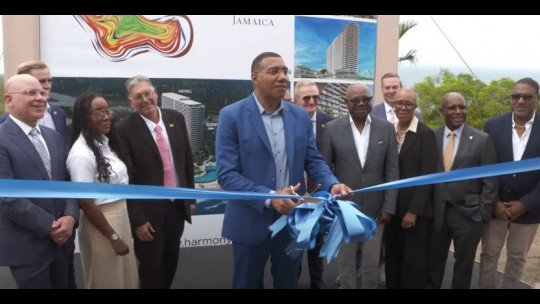Harmony Cove’s Self-Representation Model: A Cause for Concern?
In a recent development that has stirred the waters of Jamaica’s labor landscape, Kurt Fletcher, the Island Supervisor at the National Workers Union, has raised alarms about Harmony Cove’s proposed self-representation model for its employees. This comes on the heels of Prime Minister Dr. Andrew Holness inaugurating the ambitious US$1 billion project in Duncans, Trelawny, which promises to reshape the tourism and real estate sectors in Jamaica.
A Glimpse into Harmony Cove
Harmony Cove is set to be a massive undertaking, sprawling across 2,300 acres on Jamaica’s picturesque northwestern coast, nestled between the vibrant towns of Montego Bay and Ocho Rios. This partnership between Nexus Luxury Collection and the Jamaican government aims to create a luxurious haven for tourists, reminiscent of high-end resorts like Albany in the Bahamas.
Project Manager Christopher Anand has been vocal about the vision for Harmony Cove. He emphasized that the model they plan to implement will mirror the successful practices at Albany, where employees are said to thrive under a self-governing system. "People don’t get let go at Albany," Anand stated confidently. "It will be Jamaican-run. We will be the best payers in hospitality because that’s how you get the best star, and also they have a voice at all times."
The Union’s Perspective
However, Fletcher’s concerns highlight a critical issue: the potential pitfalls of self-governance in the workplace. Speaking with Radio Jamaica News, he described the idea of internal unions as a "facade." He argued that employees might hesitate to voice concerns or dissent due to fear of jeopardizing their jobs. "If you are going to self-govern yourself… then you won’t find any objectivity in there," he warned.
Fletcher emphasized the importance of independent trade unions, which serve as objective representatives for workers. "We represent our workers without fear or favour," he asserted. This independence is crucial, especially in an industry like tourism, where job security can be precarious.
The Challenges Ahead
Fletcher also pointed out that asking workers to manage their own representation could distract them from their primary responsibilities. "You are going to take up now workers, especially in the tourism industry, who have a lot of work to do by taking care of the guests… and ask them to dedicate themselves to trying to learn," he explained. This, he believes, could lead to a chaotic work environment, where the focus shifts from guest satisfaction to internal politics.
Moreover, Fletcher raised concerns about the lack of professional guidance in navigating labor laws. "Trade unionists are professionals who understand the labour laws," he noted, suggesting that conflicts between employers and employees would be better managed by trained union representatives.
A Broader Conversation
As Harmony Cove gears up to become a cornerstone of Jamaica’s tourism industry, the debate surrounding its self-representation model raises important questions about worker rights and job security. Will the promise of a self-governing workplace truly empower employees, or will it create an environment of fear and uncertainty?
As the project unfolds, many are left wondering: can a balance be struck between innovative management models and the essential protections that unions provide? The future of Harmony Cove may depend on how these concerns are addressed, ensuring that the voices of workers are not just heard but valued.

